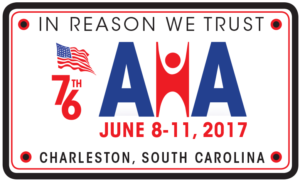Going There in Charleston: AHA Conference Celebrates and Challenges Humanist Philosophy

On Monday, June 5, I started my first day at the American Humanist Association in Washington, DC, as the summer editorial intern for the Humanist magazine. On Wednesday, June 7 I flew out to Charleston, South Carolina, for the AHA’s 76th Annual Conference. It was a bit of a whirlwind to say the least. However, having just heard about the philosophy of humanism when I applied for the position back in April, it was a fantastic way to be introduced to the national reach and guiding values of the organization.
Not only was I able to meet and interact with accomplished members and directors of the AHA who came from all over the country, I was also able to gain a sense for the old and new directions of the humanist movement.
From presentations like Greta Christina’s “Navigating Humanist Sexuality,” Abby Hafer’s “Everything You Know About Sex is Wrong,” and Trav Mamone’s “WTF Is Genderqueer?” it became clear to me that humanists love science and sex. Hafer eloquently proved how the idea of what is “natural” when it comes to sex is not limited to the bounds of scripture or social norms, but is simply anything and everything that occurs between living organisms from fish to humans. Mamone introduced a comprehensive dictionary for understanding gender identity and expression that gave conference attendees a clear idea of what it means to be transgender, cisgender, and everything in between. Christina provided insight into the judgmental religious values that can still seep into the attitudes of humanists when discussing the varied sex lives of others. These talks, along with a conversation I had with an attendee who admonished the Christian guilt that ultimately ruins sex, made for an atmosphere of openness and inquiry.
Boundaries were pushed even further by the presentations and panel discussions on the intersections of humanism and race. “What Does a More Inclusive Humanism Look Like?” was a panel moderated by AHA Social Justice Coordinator Sincere Kirabo that challenged the progressivism of those in the mostly white, mostly older audience. He was joined by community organizer Diane Burkholder, Professor Robin DiAngelo, and activist Desiree Kane, for what became an exploration of how true inclusivity of marginalized groups is more than just having “marched in the sixties”—it’s about the ceding of power over social justice movements to people of color who have a more immediate range of experience and perspective and are the true stakeholders.
These themes were further touched upon in the panel discussion and presentation led by Rajani Gudlavalleti and Conor Robinson, “Humanists Can Also Have a Savior Complex: How to Avoid Activist Pitfalls,” whereby both panelists extolled the important idea that marginalized groups do not need to be “saved” by white activists, but rather need to be given a seat at the head of the table about issues that affect them the most.
Being a person in her early twenties who just graduated from a liberal university, these ideas and concepts were familiar to me as I sat in the large plenary rooms with my head nodding in agreement with all the panelists had to say. However, I had a sense that these ideas were much newer and shock-inducing to my fellow audience members, most of whom had thirty to forty years on me, but may never had heard of the terms “erasure” or “white fragility.” As this was my first exposure to humanism on a mass scale it was great to see the AHA’s commitment to dealing with these hard questions of social justice and power, rather than just catering to the audience with celebratory pats on back. An organization’s ability to be self-critical and aware shows a true dedication to progress and improvement that made me proud to don the “Staff” name badge all weekend.
The biggest treat of the conference by far was hearing from all the amazing awardees: from Humanist of the Year Adam Savage to the Feminist Humanist Award recipient Susie Bright. They spoke about their personal journeys in science and inquiry as well as their dedication to equality and fairness all the while making hilarious quips about navigating parenthood while promoting humanistic and socially progressive values. They were in fabulous company with Martin Castro, recipient of the Religious Liberty Award, who spent his long and decorated career as a champion for diverse communities—evidenced by his extensive and important work as the chairman of the United States Commission on Civil Liberties under President Obama. Dr. Sylvia Earle took home the Isaac Asimov Science Award for her incredible lifetime commitment to researching and protecting the deep sea. She treated her audience to an informative presentation about the threats sea life faces and the newest technologies in ocean exploration that are helping to combat these threats while also increasing access to the wonders of the ocean.
Certainly, a memorable moment of the award ceremonies came when Herb Silverman, longtime activist in the humanist and secular movements, peeled off his iconic “Smile, there is no hell” t-shirt on stage and switched into a more occasion-appropriate tuxedo t-shirt in order to accept his Lifetime Achievement Award. What followed was a serious, satirical, and at times provocative address that summed up the inspiring, engaging, and challenging atmosphere of the 76th Annual Conference of the American Humanist Association.
